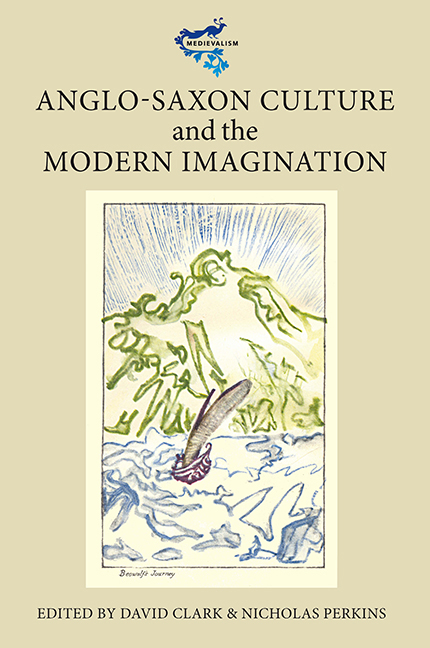Book contents
- Frontmatter
- Contents
- List of Illustrations
- Contributors
- Foreword
- Acknowledgements
- Abbreviations
- Introduction
- 1 From Heorot to Hollywood: Beowulf in its Third Millennium
- 2 Priming the Poets: The Making of Henry Sweet's Anglo-Saxon Reader
- 3 Owed to Both Sides: W.H. Auden's double debt to the literature of the North
- 4 Writing for an Anglo-Saxon Audience in the Twentieth Century: J.R.R. Tolkien's Old English Chronicles
- 5 ‘Wounded men and wounded trees’: David Jones and the Anglo-Saxon Culture Tangle
- 6 Basil Bunting, Briggflatts, Lindisfarne, and Anglo-Saxon Interlace
- 7 BOOO Seeing Beowulf in Pictures and Print
- 8 Window in the Wall: Looking for Grand Opera in John Gardner's Grendel
- 9 Re-placing Masculinity: The DC Comics Beowulf Series and its Context, 1975–6
- 10 P.D. James Reads Beowulf
- 11 Ban Welondes: Wayland Smith in Popular Culture
- 12 ‘Overlord of the M5’: The Superlative Structure of Sovereignty in Geoffrey Hill's Mercian Hymns
- 13 The Absent Anglo-Saxon Past in Ted Hughes's Elmet
- 14 Resurrecting Saxon Things: Peter Reading, ‘species decline’, and Old English Poetry
- Index
12 - ‘Overlord of the M5’: The Superlative Structure of Sovereignty in Geoffrey Hill's Mercian Hymns
Published online by Cambridge University Press: 20 April 2017
- Frontmatter
- Contents
- List of Illustrations
- Contributors
- Foreword
- Acknowledgements
- Abbreviations
- Introduction
- 1 From Heorot to Hollywood: Beowulf in its Third Millennium
- 2 Priming the Poets: The Making of Henry Sweet's Anglo-Saxon Reader
- 3 Owed to Both Sides: W.H. Auden's double debt to the literature of the North
- 4 Writing for an Anglo-Saxon Audience in the Twentieth Century: J.R.R. Tolkien's Old English Chronicles
- 5 ‘Wounded men and wounded trees’: David Jones and the Anglo-Saxon Culture Tangle
- 6 Basil Bunting, Briggflatts, Lindisfarne, and Anglo-Saxon Interlace
- 7 BOOO Seeing Beowulf in Pictures and Print
- 8 Window in the Wall: Looking for Grand Opera in John Gardner's Grendel
- 9 Re-placing Masculinity: The DC Comics Beowulf Series and its Context, 1975–6
- 10 P.D. James Reads Beowulf
- 11 Ban Welondes: Wayland Smith in Popular Culture
- 12 ‘Overlord of the M5’: The Superlative Structure of Sovereignty in Geoffrey Hill's Mercian Hymns
- 13 The Absent Anglo-Saxon Past in Ted Hughes's Elmet
- 14 Resurrecting Saxon Things: Peter Reading, ‘species decline’, and Old English Poetry
- Index
Summary
Lecturer in Shakespeare Studies at King's College London
Introduction
Geoffrey Hill'sMercian Hymns (1971) tell of Offa, ‘presiding genius of the West Midlands, his dominion enduring from the middle of the eighth century until the middle of the twentieth (and possibly beyond)’. The Anglo-Saxon Chronicle entry for 757 (B-Text) informs us:
Ј þy ilcan geare man ofsloh Æþelbald Myrcna cing on Secggandune, Ј his lic liþ on Hreopandune; Ј Beornred feng to rice Ј hit lytle hwile heold Ј ungefealice; Ј þy ilcan geare feng Offa to rice Ј þæt heold .xxxix. wintra.
And in that same year men killed Æthelbald, the Mercian king, at Seckington, and his body lies at Repton; and Beornred took power and held it miserably for a little while; and that same year Offa took power and held it for 39 winters.
The grammatical construction is such that Offa literally takes to power or the realm (‘feng Offa to rice’ in the Old English), much as a modern monarch is said synecdochically to take to the throne. ‘Sovereign is he who decides on the exception’, writes Carl Schmitt in March 1922. The noun-state of the ‘Sovereign’ is constituted, to Schmitt's view, out of the act of designating another noun, deciding upon ‘the exception’. By a process of what Giorgio Agamben describes as an ‘inclusive exclusion’ it is this relation to the other which allows the assumption of the name of ‘sovereign’: ‘The exception does not subtract itself from the rule; rather, the rule, suspending itself, gives rise to the exception and, maintaining itself in relation to the exception, first constitutes itself as a rule.’ As power, ‘rice’ is synonymous with Offa taking it up, so sovereignty as elaborated by Agamben, following Schmitt, constitutively constructs and maintains itself in relation to the other by denominating the exception. In this essay I will show how the Mercian Hymns work through and across the theoretical and linguistic distance that separates these two versions of sovereignty.
I will also suggest the need to revisit the multiple historical contexts of Hill's poetic sequence, and to take seriously his treatment of Anglo-Saxon sources in particular. Those quick to brand Hill's poetics difficult have been slower to pursue the hints offered to us by the author himself, in the form of the notes to the Hymns.
- Type
- Chapter
- Information
- Anglo-Saxon Culture and the Modern Imagination , pp. 219 - 236Publisher: Boydell & BrewerPrint publication year: 2010



